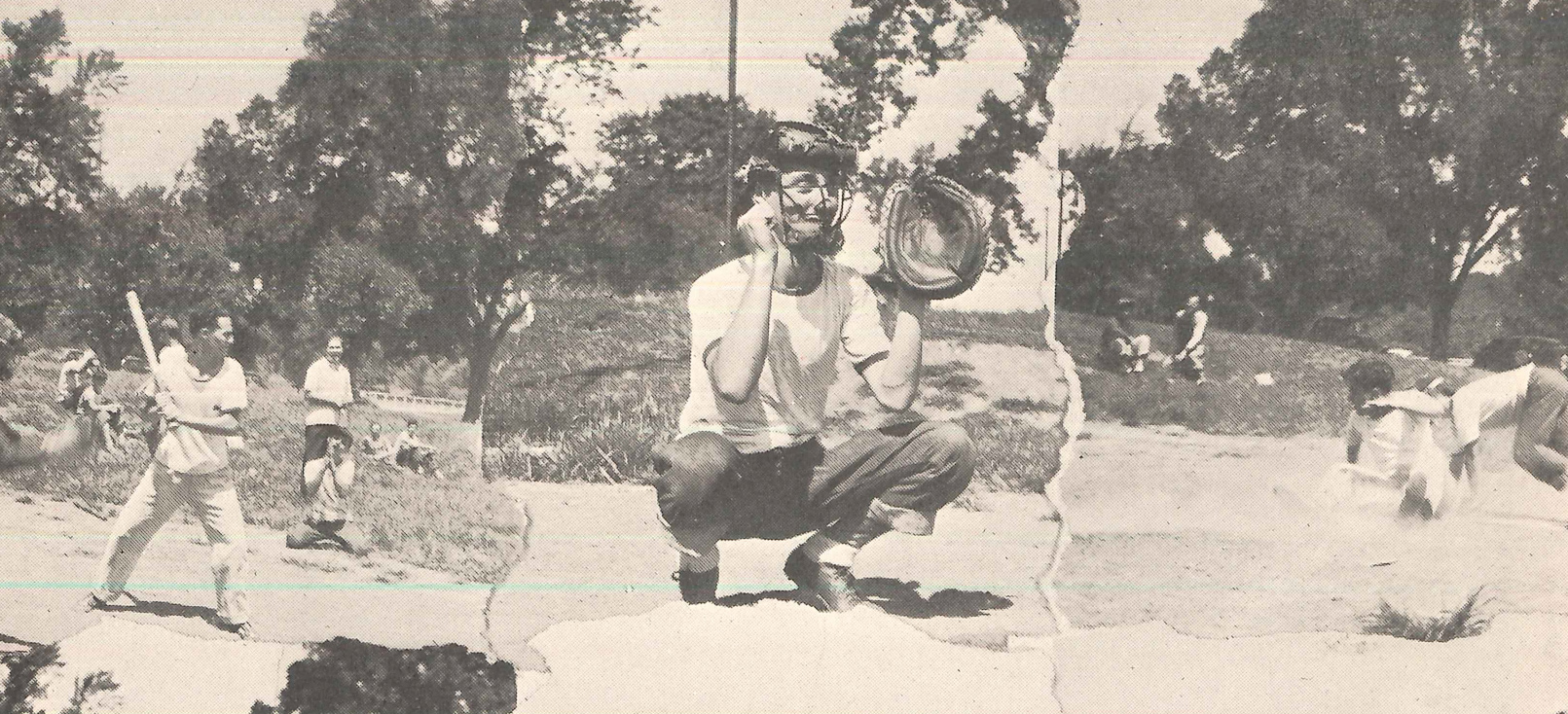
100 Years Ago
(From the Aug. 22, 1924 issue of The Kansas City Jewish Chronicle)
Aleph Zadik Aleph Order for Young Men
The first annual A.Z.A. dance will be held Wednesday evening, August 27th, on the Roof Garden of the Y.M.H.A. Good dance music will be furnished. Many surprises are also being planned.
The A.Z.A. and the Maccabaean clus again held a joint meeting Sunday afternoon. The program was furnished by members of both clubs. The program was very well received by the large crowd present and several interesting discussions were held on the various numbers. Bernard Theodore, a Brother Aleph from Omaha, was one of the visitors.
The Advisory Board is making rapid progress; several prominent men signifying their willingness to help the A.Z.A. movement.
Tryouts for a degree team will be held August 31st. As soon after this date as possible those who have joined lately will receive the ritual. A drive for membership will be launched soon. At present there are 18 members.
A committee, with Abe Margolin as chairman, has gone to St. Joseph to start a new chapter.
Maccabaean club
Enthusiastic discussion followed the interesting and well prepared numbers of the program given at the joint meeting of the A.Z.A.’s and the Maccabaean clubs. The latter was the guest of the former at the Y.M.H.A. building Sunday afternoon. There was a large crowd.
Louis Greenberg’s talk on the “American Politics and the Jew” showed an intelligent and well thought-out viewpoint. He brought forth that prejudice did exist not only against Jews but also against other groups as well, and that equally of opportunity in politics was a constitutional privilege that as yet was not exercised. Julius Peltzman’s rendering of the “Police Court Scene” was uproariously funny and was handled in a masterly manner. Jack Parelman gave “A Review of the Recent Untermyer Klan Incident” in such an intensely interesting fashion that a heated debate followed in which nearly every one present participated.
Philip Klutznick’s presentation of the “Single Tax Question” as outlined in a book on the science of political ethics was forceful and comprehensive. Daniel Brenner closed the program with a stirring appeal to the Jewish youth of America to return to the fold of its own religion. His subject was, “The Young American Jew and His Religion.”
The joint meetings of the two clubs have been so interesting, well attended and enthusiastic that more of them are contemplated for the near future.

25 Years Ago
(The following article on the death of Two’s legend Phil Klutznick was written by Joesph Aaron and first ran on the front page of The Kansas City Jewish Chronicle on Aug. 22, 1999)
Philip Klutznick will be remembered as an innovative thinker and a bold doer, a man who did much to build the face of the new state of Israel, someone who shaped his times and often saw ahead of his time; a leader who was one of the greatest Jews of the 20th century.
He died in his home in Chicago this past Saturday at the age of 92 having for the past several years endured the effects of Alzheimer’s Disease.
His life was filled with 10 lives’ worth of accomplishments, a life whose achievements in but one sphere would be considered remarkable. That he did so much in so many spheres is truly amazing.
His achievements as a businessman are the stuff of legend. Creator of the Chicago suburb of Park Forest.
Developer of the nation’s first shopping malls. Chairman of one of the most successful development companies in the United States…
His achievements as government official are the stuff of legend. Service in seven administrations from Franklin Roosevelt to Jimmy Carter, Wartime commissioner of the Federal Housing Authority. United States Ambassador to the Economic and Social Council of the United Nations.
Secretary of Commerce. And more.
His achievements as a Jewish leader are the stuff of legend.
International president of B’nai B’rith, president of the World Jewish Congress, founder of the Conference of Presidents of Major American Jewish Organizations, president of the Memorial Foundation for Jewish Culture, vice president of the Conference on Jewish Material Claims Against Germany, one of the creators of the Museum of the Diaspora. And more.
His achievements on behalf of and in the service of the state of Israel are the stuff of legend. Developer of the southern port of Ashdod. Negotiator whose personal intervention led to the release from detention of 8,500 Moroccan Jews, winning their right to go to Israel. Backstage contact responsible for the Soviets letting our people go. Steadfast conciliator when the Eisenhower administration’s hostility to Israel was clear, so clear that Secretary of State John Foster Dulles said his Mideast policy was based on “the need to allay Arab discontent arising from the establishment of the state of Israel.” Prophetic visionary who saw the only path that would lead to peace a decade before events proved him right. And more.
“He is one of the greatest American Jews that ever lived,” said Rabbi Arnold Jacob Wolf, retired rabbi of Chicago’s K.A.M. Isaiah Israel Congregation.
Kansas City born
It was a life that began on July 9, 1907 in Kansas City, where Philip Klutznick was born to Morris and Minnie Klutznick, Orthodox Jews from Eastern Europe who had come to this country in the great migration at the end of the 19th century.
His father began as a shoe salesman, eventually owning his own shoe store. The Klutznicks’ first home was above that store. A fact of his life that didn’t’ change , though Philip’s life would see him reach heights and go places very far from humble beginnings in Kansas City.
A point that was made in jest during his Senate confirmation hearing to be Secretary of Commerce in 1980. As he was introduced, his background was described and then it was noted that he was “still living above the store.” Only this time, it was his 72nd floor apartment on the top of Water Tower Place in downtown Chicago, a place he had built.
Kansas City attorney Mark Gilgus, who attended the funeral Monday, Aug. 16, in Chicago, is Klutznick’s great-nephew.
Giglus recalled a connection between Klutznick and the inventor of basketball, Dr. James Naismith.
“He went to KU and was rather heavy at the time,” he said. “Dr. Naismith got my uncle Phil on a workout regime, and it resulted in him losing lots of weights and getting into good physical condition.”
His great-nephew fondly recalled visiting “Uncle Phil” in Chicago.
“He would always take me to lunch at the Carlton Club. We’d spend two hours talking politics. His favorite subject was B’nai B’rith,” said Gilgus, who was recently appointed chair of the organization’s International Center for Public Policy. “I was active in Democratic politics. In ’84, I ran for Missouri state representative for the south Kansas City district. And he came in to do a fund-raiser for me. He inspired me personally to do a lot of things.”
Gilgus said Klutznick often returned to Kansas City to visit his late mother during her stay at Shalom Geriatric Center.
“And he would periodically come to visit here or for weddings and funerals and other family occasions,” he said. “After my grandmother died, most of the family had moved to Chicago.”
Gilgus said Klutznick set a fine example for fellow Jews.
‘”He inspired so many people over his life, he must be one of the greatest Jewish leaders of this century,” he said. “And on a worldwide Jewry basis, his impact was great as well.”
A sense of community
That involvement started young. Concerned that young Jews should have clubs of their own, Klutznick became active in AZA, the youth arm of B’nai B’rith. It wasn’t long before he was elected Grand Aleph Godol, the head of but the first of many Jewish organizations he would come to lead.
Klutznick later attended law school at Creighton University. After graduating and after meeting the woman who be his wife for more than 60 years, Ethel Riekes, he decided to settle in Omaha, Neb.
Which is where is involvement in government began, which would eventually lead to his business career. As an assistant corporation counsel for the city, Klutznick became an expert on how a city might use New Deal legislation to attract funds that would improve the quality of life for its citizens.
Working on public housing issues, first for Omaha and then for the state of Nebraska, led to his appointment as wartime commissioner of the Federal Public Housing Authority, where he was responsible for providing housing to more than 850,000 workers all over the country involved in the war effort.
After the war, Klutznick accepted an offer to become president of American Community of Builders, a move that would bring him to Chicago, where he would spend the rest of his life.
His mission was to construct a new town south of Chicago, a town that would be built from scratch, a town that would provide affordable rental housing and convey a sense of community.
The town was Park Forest. And, thanks to Klutznick’s innovations and sensitivity, it was a town that would serve as a model for others.
In his book, “The Organization Man,” William Whyte notes, “The people who went to Park Forest, went there because it was the best housing for the money.” Once, there, however, under the stimulus of the developers, “they created something over and above the original bargain … They developed a social atmosphere of striking vigor.”
Klutznick and his wife raised their four sons and one daughter in Park Forest. But while he was busy building that new community, he continued his work in government and in Jewish affairs.
Which made the Klutznick house one very stimulating place to be, says his son Jim.
“He was not the kind of father you played baseball with,” said Jim. “I remember once he felt the obligation to take us to a Cubs game. He sat there the whole time reading the newspaper. He was always reading, always writing, always attuned to what was going on in the world. And he took us everywhere as he traveled the world. He showed us the whole world. My mom was very kind, the top sergeant in the family who mustered the troops so that we could march off to wherever dad was, meeting this prime minister or that president. He was treated almost as a head of state in his position as international president of B’nai B’rith.
“He shared all that with us. It was always interesting to sit at the dinner table and discuss and debate. We had great debates, it was a fun table to be at. We were always in touch with what was going on in the world and had a sense of the national and international Jewish community.”
Common touch
An international Jewish community in which Klutznick was becoming a more and more important player. In 1953, he was elected international president of B’nai B’rith.
In addition to B’nai B’rith, Klutznick worked closely with World Jewish Congress head Nachum Goldmann in negotiating reparations from the German government. At the same time, Klutzmck also played a key role as adviser to presidential candidate Adlai Stevenson in the 1952 and 1956 campaigns and to John Kennedy in the 1960 race. He frequently advised Chicago Mayor Richard J. Daley on ‘business and urban issues.
And yet he never lost his common touch, said Rabbi William Z. Novick, director of the Chicago Region, American Committee for the Weizmann Institute of Science.
“He walked in high positions, with the might of kings with people ·of power and influence, but he never lost the commitment to Jewish survival.”
Novick said. He “demonstrated to the Jewish community, high and low, that you have a responsibility not to cut your roots.
“He could walk among the high political world and the world of Jewish masses, and have a commitment to both,” Novick said. “I never met a man who knew better how to relate to the professional Jewish worker, to the highest posters, yet he never thought of himself as a mighty power,” he said.
Rabbi Morris Margolies met Klutznick in both Kansas City and Chicago.
“I met him for the time when I was a rabbi in Chicago,” Rabbi Margolies recalled. “It was 1945 or ’46, at a convention of Zionists in Chicago. … He was outspoken, folksy and reachable at the same time. He was one of the most influential B’nai B’rith presidents in the history of that organization. … As national president of Jewish organizations go, he was one of the more knowledgeable Jews. He was very well read. He always understood that learning is at the heart of being Jewish.”
Jewish unity was always something very important to Klutznick, who learned back in Kansas City the need for Jews to work together productively. That, however, wasn’t happening with national Jewish organizations, which were competing with each other for turf, fighting with each other and so sending confusing signals to the general community.
Something needs to be done so that Jews spoke with a unified voice and so that decisions were made in a rational way. Klutznick thus came up with the idea of the Conference of Presidents of Major American Jewish Organizations, bringing together under one umbrella the heads of 16 national Jewish groups.
It was a role he would also play in his new hometown of Chicago. Klutznick realized the overlapping waste of having two separate, major fund-raiding campaigns in the city, which what the Jewish community had. And so, he proposed a merger. It agreed to and Klutznick became the first campaign chairman of the new Jewish United Fund.
“He had the capacity to move people beyond their own fears,” said Tom Klutznick. “His integrity was absolute. He would talk to a B’nai B’rith convention for two hours and you could hear a pin drop. Both because of his eloquence and because of the substance of what he was saying.”
“I hear it all the time,” said Bettylou Saltzman, his eldest child and only daughter. “People are always telling me how they looked up to my father, how he was their hero, their role model.”
Independent thinker
Then there was perhaps his most courageous, most prophetic act a Jewish leader. An act that history has shown was bold and necessary, and act that was a decade, and light years, ahead of its time.
It was in 1982, after touring the Middle East and visiting Israel, Egypt, Saudi Arabia, Jordan and Syria, that Klutznick issued a statement along with Pierre Mendes-France, the former prime minister of France and Nachum Goldmann, longtime head of the World Jewish Congress.
The essence of their statement, which became known as the Paris Declaration, was that for true peace to be achieved, Israel would have to negotiate with the PLO and Yasser Arafat. It was a daring thing to say back then, and Klutznick came under a barrage of attack from many quarters in the Jewish community.
“He got a lot of terrible mail and calls,” said his son, Jim. “But he would never get angry about it. And he would caution me, who did get angry, that it’s important to always consider the other point of view, to appreciate every human being.”
Attorney Joel Sprayregen said Klutznick’s initiative was symbolic of what made him such “a towering figure” who “always sought innovative, independent thinking, even when that thinking ran counter to what the conventional wisdom was.
“He had the courage of his convictions,” Sprayregen said, noting that the Oslo Accords, signed more than a decade after Klutznick’s proposal, bear a strong resemblance and owe much to Klutznick’s foresight.
Newton Minow, Klutznick’s attorney and friend since the 1950s, said, “When I think of him, I always think of the ancient prophets. He told people what was true even when they didn’t want to hear it.
“He had a lot of courage and a lot of vision, and he’s certainly been proven right on issues on the Middle East.
“He was one of our great leaders, not just a Jewish leader, but one of the great Americans of our time,” Minow said. “And at the same time, he was a great family guy. A lot of people who are very involved in their work neglect their family. He’s the opposite. He’s a role model in that respect as well.”
(Joesph Aaron is editor and publisher of The Chicago Jewish News; Kansas City Jewish Chronicle staff writer Christopher Goldman also contributed information to this story)




